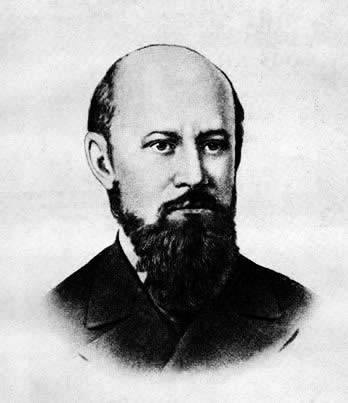On this day 121 years ago, the Russian encyclopaedist and populariser of science
Mikhail Filipov died under strange circumstances.
He earned a doctorate in "natural philosophy" from the University of Heidelberg in Germany, and later became the founder, publisher, and editor of the journal
Scientific Review. In co-authorship with Croatian historian Marko Došen, Filipov wrote and published the book "The Croats and Their Struggle with Austria". He was also the author and editor of the three-volume Encyclopaedic Dictionary (published by P. P. Soykin). He translated the works of Darwin and other foreign scientists into Russian, as well as the works of Mendeleev into French; he was an author-biographer in the series "The Lives of Remarkable People". He is the author of 300 scientific works.

He died under unclear circumstances in St. Petersburg: on 12 June 1903 (Julian calendar), Filippov was found dead in his own home laboratory on the 5th floor of a house at 37 Zhukovsky Street (belonging to Elizaveta, Saltykov-Shchedrin's widow). The official version - apoplectic stroke. The BSE says: "Tragically died in his laboratory during experiments with explosives". Filippov's documents and instruments were seized and are considered lost.
The editors of the newspaper "St. Petersburg Vedomosti" received Filippov's letter, written and sent just the day before that tragic night:
"In my early youth I read from Bocles that the invention of gunpowder made wars less bloody. Since then I have been haunted by the thought of the possibility of an invention which would make wars almost impossible. Surprisingly enough, the other day I made a discovery, the practical development of which would virtually abolish war. I have invented a method of transmission over a distance of an explosion wave through electricity, and, judging by the method used, this transmission is possible over a distance of thousands of kilometres, so that, having made an explosion in St. Petersburg, it will be possible to transmit its effect to Constantinople. The method is marvellously simple and cheap. But with such a conduct of war at the distances I have indicated, war actually becomes madness and must be abolished. I shall publish the details in the autumn in the memoirs of the Academy of Sciences. The experiments are slowed down by the extraordinary danger of the substances used, partly very explosive, like nitrogen trichloride, partly extremely poisonous."
The magazine "Technology for the Youth" in
the article "The War of the Rays" 25 years ago noted:
And although the government took a very cool attitude to all these publications, the newspapermen did not calm down and continued their excavations. Thus, the Moscow newspaper "Russkoye Slovo" eventually found out that the inventor travelled quite often to Riga, where back in 1900 "in the presence of some experts made experiments of blowing up objects at a distance". And when he returned to St. Petersburg, he said that he was extremely satisfied with the results of the experiments.
When the newspaper correspondents tried to find the preparations and equipment from Filippov's laboratory, seized during the search by the St. Petersburg security department, as well as his papers, including the manuscript of the book, it turned out that all this disappeared without a trace, and with the assistance of members of the royal family, and the Emperor Nicholas II himself.
The case became even more intriguing when it turned out that the seized manuscript was called "Revolution through Science, or the End of Wars". And it was not a purely theoretical work. Filippov wrote to friends - and his letters must have been opened and read by the secret police - that he had made an amazing discovery. It seems that he had actually found a way to reproduce by means of a directed beam of short radio waves the action of an explosion.
"I can reproduce by a beam of short waves the full force of the explosion," he wrote in one of the letters found. - The blast wave is completely transmitted along the carrier electromagnetic wave, and thus a charge of dynamite exploded in Moscow can transmit its effect to Constantinople. The experiments I have made show that this phenomenon can be induced at a distance of several thousand kilometres. The use of such a weapon in a revolution will cause nations to rise up, and wars will be rendered quite impossible".
#
death #
deathray #
nyen #
physics #
revision #
russianempire #
technology #
warfare